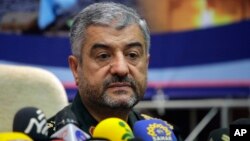The chief of Iran's powerful Revolutionary Guards is warning regional U.S. military bases in the Mideast would be at risk of an Iranian missile attack if Washington imposes new sanctions against Tehran.
U.S. President Donald Trump plans to declare in the coming days that Iran is not in compliance with the 2015 international agreement to curb its nuclear weapons agreement, but then give Congress 60 days to decide whether to renew economic sanctions against Tehran.
But Iranian state media quoted Guards' commander Mohammad Ali Jafari as warning Sunday if new sanctions are imposed, the United States would have to "move their regional bases outside the 2,000 kilometer range of Iran's missiles."
U.S. military bases are located in Bahrain, Iraq, Oman, and Afghanistan, all within 500 kilometers of Iran's borders.
Jafari rejected negotiations with the United States over regional issues and said if the U.S. designates the Revolutionary Guards as a terrorist group, then Tehran would also consider the U.S. military as terrorists.
"If the news is correct about the stupidity of the American government in considering the Revolutionary Guards a terrorist group, then the Revolutionary Guards will consider the American army to be like Islamic State all around the world, particularly in the Middle East," said Jafari.
He said new U.S. sanctions would end "any chance for engagement forever" between Washington and Tehran.
Trump, as he huddled last week with his military leaders, said Iran has "not lived up to the spirit of the agreement" curtailing Iran's nuclear program that Tehran reached with the United States, France, Britain, Germany, China and Russia in exchange for easing crippling economic sanctions.
"The Iranian regime supports terrorism and exports violence and chaos across the Middle East," said Trump. "That is why we must put an end to Iran's continued aggression and nuclear ambitions."
During his 2016 run for the White House, Trump vowed to pull out from the Iran deal. But he now appears to be set to take a more nuanced stance, refusing to certify again, as he has twice already, that Iran is in compliance with the pact, and then toss the complex issue of compliance to Congress to decide whether to renew sanctions.
The United Nations nuclear monitors say Iran is in compliance with the nuclear agreement and the five other nations in the two-year-old international agreement have shown no indication they want to renegotiate it.




